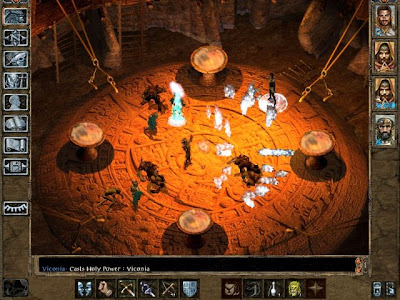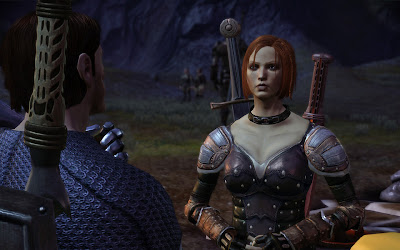Take the journal from the BG series, which documented the player's journey from a 1st person perspective, detailing quests and events in substantial detail, even including some emotional flavour. Or perhaps the Morrowind journal, as much I detested its complete lack of organisation, provided a rich description of the player's experiences.
 If we now compare to more recent big name titles, say Oblivion, Fallout 3, Dragon Age or Mass Effect 1/2, the journal (and I'll include codex entries for DA:O and ME1/2), the difference is notable.
If we now compare to more recent big name titles, say Oblivion, Fallout 3, Dragon Age or Mass Effect 1/2, the journal (and I'll include codex entries for DA:O and ME1/2), the difference is notable.- Oblivion: A short blurb for the current state of each quest.
- Fallout 3: all you get from your journal is dot points of your objectives, and a handful of audio recordings from NPCs from various quests.
- Dragon Age: Short prose in second person directing the player of their objective, along with matter of fact codex entries.
- Mass Effect: Dot point objectives for quests and a brief outline of a quest, and matter-of-fact codex entries.
 For one, with the increased detail and opportunity for choice, ascribing a particular emotion from a 1st person perspective is difficult, and may not match with the player's own roleplaying of their character. We no longer gain insight into the game world through the subjective eyes of our character, the almost stale encyclopedia-like entries that exist in the codex for Dragon Age and Mass Effect 1/2 fall short in comparison. Sure, we're still getting a comprehensive and detailed look into the well-developed universe that we're playing in, but we're being given a guidebook of facts rather than a meaningful first-hand account from a real person. That's why I believe the best codex entries in Dragon Age are those that are accounts from characters within the world, coloured with their own opinions.
For one, with the increased detail and opportunity for choice, ascribing a particular emotion from a 1st person perspective is difficult, and may not match with the player's own roleplaying of their character. We no longer gain insight into the game world through the subjective eyes of our character, the almost stale encyclopedia-like entries that exist in the codex for Dragon Age and Mass Effect 1/2 fall short in comparison. Sure, we're still getting a comprehensive and detailed look into the well-developed universe that we're playing in, but we're being given a guidebook of facts rather than a meaningful first-hand account from a real person. That's why I believe the best codex entries in Dragon Age are those that are accounts from characters within the world, coloured with their own opinions.The real problem seems to be that gamers are more demanding these days and are less liable to explore and wander freely. I'm going to suggest World of Warcraft as the culprit in getting everyone used to the mechanic of plot assist markers in the form of exclamation marks (or question marks) above their head. So players expect to be told exactly where to go.
For my Dragon Age mod Alley of Murders, one of the quests demanded the players interact with a particular placeable in order to advance a quest. I did not give the player a specific instruction to interact do this aside from a journal entry telling the player to search an area. There were quite a number of players that could not figure out how to move the quest forward and asked for help. I subsequently released an updated version with a plot assist marker placed above the placeable to eliminate this problem. But I wonder if these markers are crippling the curiosity of players.
Do players now expect to be told where to go and hence do not explore areas like they used to? Do players not want to read through semi-lengthy journal entries in order to determine what they need to do? Do players now want to be explicitly told exactly how and where to resolve a quest?
In essence, are we trading away a stronger narrative influence on our game through its journal for increased ability to find and resolve quests? Is the increased usability worth it, or are we losing too much immersion and depth as a result of this change? Or better yet, can we have the best of both worlds? Perhaps the ideal option would be give the player the option to show narrative and/or explicit quest details, allowing for that rich narrative to still exist, while at the same time catering to the desire for increased usability.









